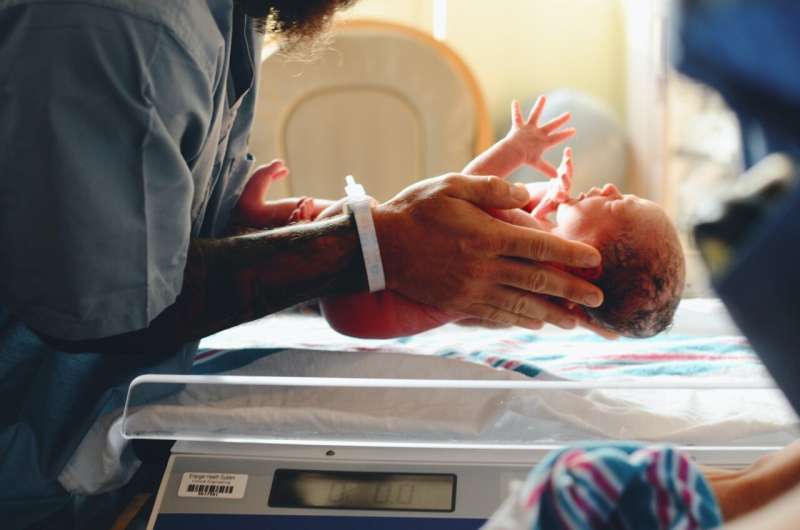This article has been reviewed according to Science X's editorial process and policies. Editors have highlighted the following attributes while ensuring the content's credibility:
fact-checked
peer-reviewed publication
trusted source
proofread
Newborn babies at risk from bacteria commonly carried by mothers, finds study

Streptococcus agalactiae (known as Group B Streptococcus, or GBS) is present in the genital tract in around one in five women. Previous research by the team at the University of Cambridge and Rosie Hospital, Cambridge University Hospitals NHS Foundation Trust, identified GBS in the placenta of around 5% of women prior to the onset of labor. Although it can be treated with antibiotics, unless screened, women will not know they are carriers.
GBS can cause sepsis, a life-threatening reaction to an infection, in the newborn. Worldwide, GBS accounts for around 50,000 stillbirths and as many as 100,000 infant deaths per year.
In a study published in Nature Microbiology, the team looked at the link between the presence of GBS in the placenta and the risk of admission of the baby to a neonatal unit. The researchers re-analyzed data available from their previous study of 436 infants born at term, confirming their findings in a second cohort of 925 pregnancies.
From their analysis, the researchers estimate that placental GBS was associated with a two- to three-fold increased risk of neonatal unit admission, with one in 200 babies admitted with sepsis associated with GBS—almost 10 times the previous estimate. The clinical assessment of these babies using the current diagnostic testing identified GBS in less than one in five of these cases.
In the U.S., all pregnant women are routinely screened for GBS and treated with antibiotics if found to be positive. In the UK, women who test positive for GBS are also treated with antibiotics—however, only a minority of pregnant women are tested for GBS, as the approach in the UK is to obtain samples only from women experiencing complications, or with other risk factors.
There are a number of reasons why women in the UK are not screened, including the fact that detecting GBS in the mother is not always straightforward and only a small minority of babies exposed to the bacteria were thought to become ill. A randomized controlled trial of screening for GBS for treatment with antibiotics is currently underway in the UK.
Dr. Francesca Gaccioli from the Department of Obstetrics & Gynecology at the University of Cambridge said, "In the UK, we've traditionally not screened mothers for GBS, but our findings—that significantly more newborns are admitted to the neonatal unit as a result of GBS-related sepsis than was previously thought—profoundly changes the risk/benefit balance of universal screening."
To improve detection, the researchers have developed an ultrasensitive PCR test, which amplifies tiny amounts of DNA or RNA from a suspected sample to check for the presence of GBS. They have filed a patent with Cambridge Enterprise, the University of Cambridge's technology transfer arm, for this test.
Professor Gordon Smith, Head of Obstetrics & Gynecology at the University of Cambridge, said, "Using this new test, we now realize that the clinically detected cases of GBS may represent the tip of the iceberg of complications arising from this infection. We hope that the ultra-sensitive test developed by our team might lead to viable point-of-care testing to inform immediate neonatal care."
When the researchers analyzed serum from the babies' umbilical cords, they found that over a third showed greatly increased levels of several cytokines—protein messengers released by the immune system. This suggests that a so-called 'cytokine storm'—an extreme immune response that causes collateral damage to the host—was behind the increased risk of disease.
More information: Placental Streptococcus agalactiae DNA is associated with neonatal unit admission and fetal pro-inflammatory cytokines in term infants, Nature Microbiology (2023). DOI: 10.1038/s41564-023-01528-2


















